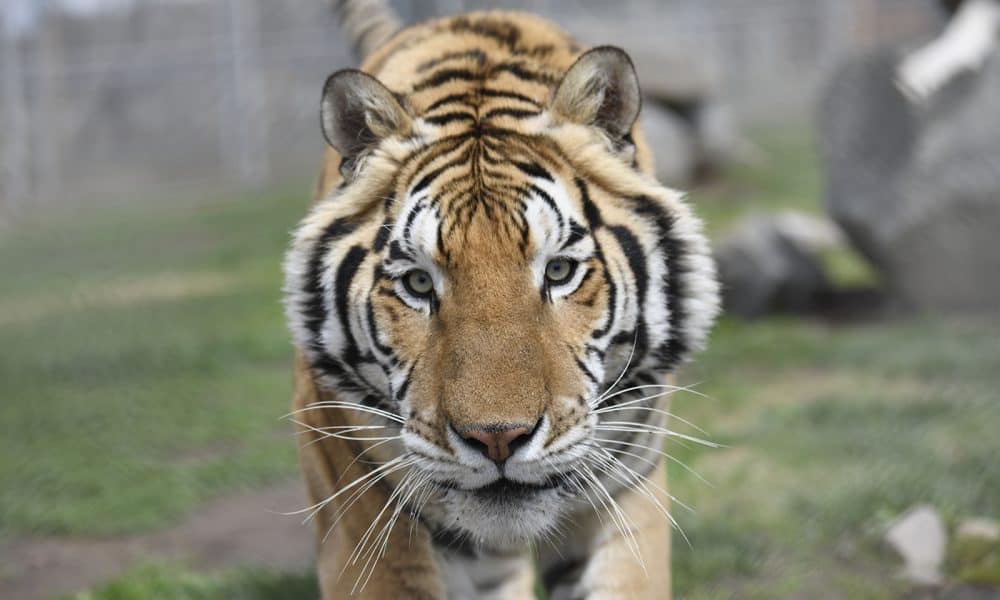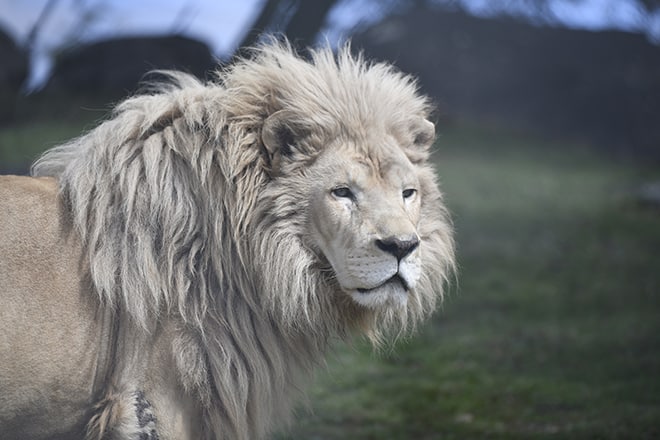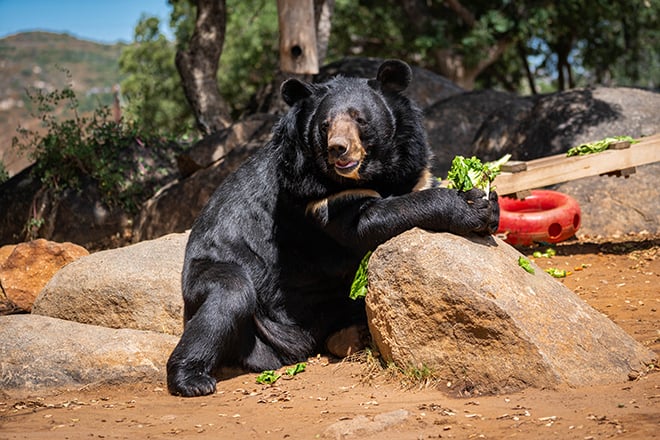

By Ashley Bendas
Now that the world has gotten a good laugh at Netflix’s “Tiger King” docuseries (and let’s be real – we all need a good laugh these days), it’s time to look past the sequins, mullets and tassels and see private exotic animal collections for what they are: cruel, abusive and sad.
Enter Bobbi Brink, a long-time exotic animal advocate and founder of Lions Tigers & Bears – one of the few exotic animal sanctuaries in the U.S. to be accredited by both the Global Federation of Animal Sanctuaries , American Sanctuary Association and a member of the https://www.bigcatalliance.org/
For nearly 30 years, Brink has worked across the country to coordinate the rescue and relocation of hundreds of big cats, bears and exotic animals – providing them an opportunity to live out their lives at reputable sanctuaries, including Lions Tigers & Bears. She has testified before Congress to advocate for legislation that would regulate the trade of these animals and is an active member of several national-level advocacy groups and committees, including the Big Cat Sanctuary Alliance and the Bear Alliance.
While “Tiger King” exemplifies all that is wrong with the twisted underworld of the exotic animal trade industry, Bobbi’s decades-long mission to care for and protect some of the world’s most magnificent animals makes her the antithesis of Joe Exotic and far more worthy of the crown.

I spoke with Bobbi to learn more about what led her to form her own sanctuary, her advocacy efforts and the difference between an accredited animal sanctuary and roadside zoos, like those featured in “Tiger King.”
WHAT WAS YOUR FIRST EXPERIENCE WITH THE EXOTIC ANIMAL TRADE INDUSTRY?
I was living in Texas in the early 1990s when I saw classified ads of tigers, lions and leopards for sale. My curiosity got the best of me, so I answered one of the ads. The first woman I visited had multiple young cubs living in her mobile home. While she cared for them, she was still breeding to sell.
As I looked further into the exotic animal trade, what I learned shook me to the core. Days-old cubs pulled from their mothers and sold for $200, tiny enclosures with concrete floors, unhealthy diets and no veterinary care… So much abuse and neglect. Since then, it has been my personal mission to end the suffering that stems from this heinous industry – one animal at a time.
TELL US ABOUT YOUR SANCTUARY, LIONS TIGERS & BEARS?
Nestled on 93 acres of a rural mountain community in eastern San Diego County, Lions Tigers & Bears is a no kill, no breed, no contact nonprofit animal sanctuary and educational facility. We provide lifetime homes to big cats, bears and other exotic animals that need a permanent safe haven. We have about 65 animals right now, including lions, tigers, white tigers, black bears, Himalayan black bears, a grizzly bear, mountain lions, leopards, bobcats, servals, plus domestic farm animals like cows, horses, chickens, goats, etc.
We are the only accredited exotic animal sanctuary in San Diego County, and we were the first in Southern California.
WHAT DOES IT MEAN TO BE AN ACCREDITTED SANCTUARY?
To be accredited, a sanctuary must meet stringent guidelines regarding habitat size, animal care, etc., outlined by the Global Federation of Animal Sanctuaries and the American Sanctuary Association. A true sanctuary will also never buy, sell, breed, trade or allow direct contact with exotic animals of any age.
WHY IS ACCREDITATION SO IMPORTANT?
What people don’t realize is just how many facilities are out there operating under the guise of conservancy and sanctuary, luring in unknowing tourists and charging top dollar for a hands-on interaction with a captive tiger – all the while, profiting on a sick cycle of animal abuse.
If a facility breeds or allows the public to handle exotic animals (like cub petting or photo opportunities), it is not a true sanctuary!
WHERE DO YOUR ANIMALS COME FROM?
While each of their stories is unique, the common bond is that they are the result of the exotic animal trade. They have been born in captivity and used for profit – like cub petting opportunities, the entertainment industry, or roadside zoos – and then dumped off. Others have been bred and sold as pets and eventually their “owners” realize they do not have the capacity or know-how to care for them.
We also have a few animals that were born in the wild – but they became habituated – meaning they became too comfortable going near humans, so they lost their chance at freedom.
WHY NOT RELEASE THEM BACK INTO THE WILD, OR AT LEAST SEND THEM TO AN ESTABLISHED ZOO?
Wild animals born in captivity cannot be released into the wild; they would never survive. And most zoos do not want these animals because they have no conservational value (often due to in-breeding or crossbreeding), so there is a need for sanctuaries like Lions Tigers & Bears to provide a lifetime, compassionate home for them.
WHY DON’T TIGERS (AND OTHER EXOTIC ANIMALS) MAKE GOOD PETS?
These are wild animals with wild animal instincts! They may start out cute and cuddly, but within a few short months, they can easily overpower a human and cause serious physical injury – even without meaning to. Many of our rescues at Lions Tigers & Bears were originally bought as pets, but as they grew, their owners realized they could no longer care for the animal properly and relinquished them to the care of a sanctuary.
Tigers, in particular, are apex predators. They are top of the food chain, and it takes specialized care and significant funds to give them a quality life. They eat up to 15 pounds of raw meat a day, and it costs about $15,000 to feed just one big cat each year. They also require a habitat that is both physically and psychologically engaging. Tigers love to swim, so they need water to fully submerge themselves in, like a pool or pond. They also require constant enrichment, such as toys or puzzles, intriguing scents, new structures and even new habitats, to keep them stimulated. A bored animal means they are not receiving proper care and are likely experiencing severe emotional distress.
The average family or individual simply does not have the knowledge, funds or space to adequately care for these animals.

LET’S TALK ABOUT TIGER KING. WHAT DO YOU THINK ABOUT THE FACILITIES SHOWN IN THE SHOW?
Facilities like that of G.W. Exotic Zoo perpetuate an industry that profits on the exploitation of all animals involved. That is what the show failed to depict – the vicious cycle of ongoing breeding, dumping and animal suffering that is required to operate these facilities.
HOW IS CUB PETTING PART OF THIS CYCLE OF ABUSE?
Female tigers are overbred, and their cubs are pulled just hours after birth to be used for photo opportunities and cub petting/handling for the first 12 weeks of their lives. After the cubs outgrow their use, what happens? The truth is – we don’t always know. Female cubs are often sold to other operators and used for perpetual breeding, others are sold off to the highest bidder, sentenced to languish at sub-par facilities lacking the space, funds or ability to offer proper care. And sometimes, the cubs are killed.
It’s also an issue of supply and demand. As long as people visit facilities where baby cubs are held and posed with, places like G.W. Zoo are going to continue to over-breed, forcing animals to live in deplorable conditions and experience great emotional distress. It is because of these facilities that we continue to have a surplus of captive tigers being exploited in our country.
IS THAT WHY YOU ARE AN ADVOCATE OF THE BIG CAT PUBLIC SAFETY ACT?
YES! Currently, there is no federal law against exotic animal ownership. While there are states that ban the practice, there are many that do not have any laws about exotic animal ownership at all. Because of this, there is no way to know just how many big cats are being kept, bred, sold or killed in captivity.
The Big Cat Public Safety Act is a federal bill that would end the private possession of big cats as pets and stop the exploitative roadside attractions which profit off cub petting and photo opportunities.
HOW CAN PEOPLE HELP MAKE A DIFFERENCE FOR THESE BIG CATS AND OTHER EXOTIC ANIMALS?
Two of the easiest ways are: 1) Pledge to never take a photo with, or handle, a wild animal of any age; and 2) Do not frequent traveling shows that feature big cats, including circuses, magic acts and big cat attractions at county fairs.
I also encourage people to educate themselves on what a true sanctuary is and to only visit sanctuaries that are accredited or verified by the Global Federation of Animal Sanctuaries, the American Sanctuary Association, and/or those that are members of the Big Cat Sanctuary Alliance.Being accredited means these facilities are implementing the highest standards of care for the animals.
You can also call your legislators and urge them to support the Big Cat Public Safety Act. We have 227 co-sponsors already, but we need even more to get the bill passed.
WHAT CAN READERS DO TO HELP LIONS TIGERS & BEARS, ESPECIALLY WHILE YOU CAN’T WELCOME GUESTS RIGHT NOW?
The COVID-19 pandemic has forced Lions Tigers & Bears to place a hold on educational visits to the sanctuary, which accounts for nearly 45% of our monthly revenue. As a nonprofit organization, we rely on contributions to rescue and support these animals. We are asking people to donate $20, then challenge 20 of their friends to do the same as part of our “Help Us Hang in There” campaign. We know this is a difficult time to ask, but we have 65 animals counting on us – and we cannot let them down!
Readers can visit https://bit.ly/LTBhanginthere to learn more.





















